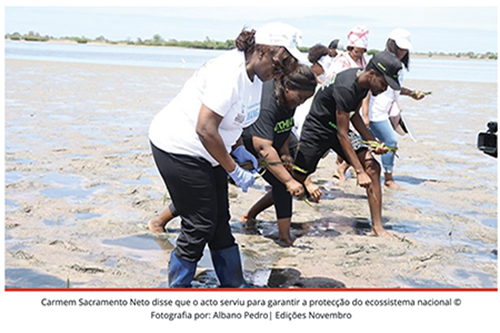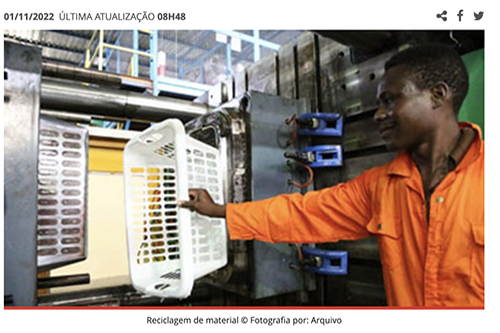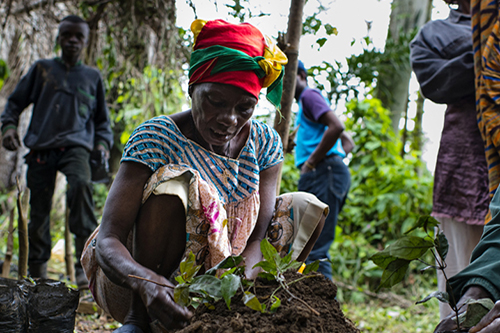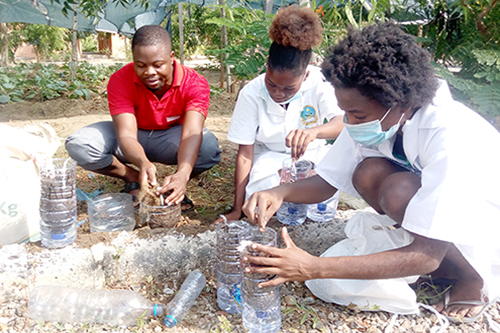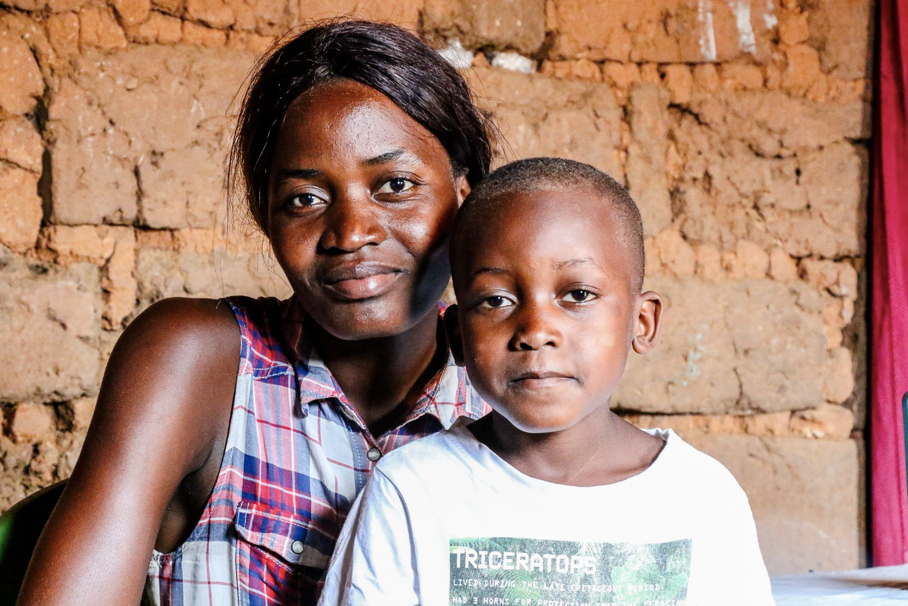Article on Jornal de Angola, 04.12.2022
by Pedro Bica
8,000 mangroves were planted yesterday in the Urban District of Ramiros, in Luanda, in connection with International Fisheries Day. The act was chaired by the Minister of Fisheries and Marine Resources, Carmem Sacramento Neto.
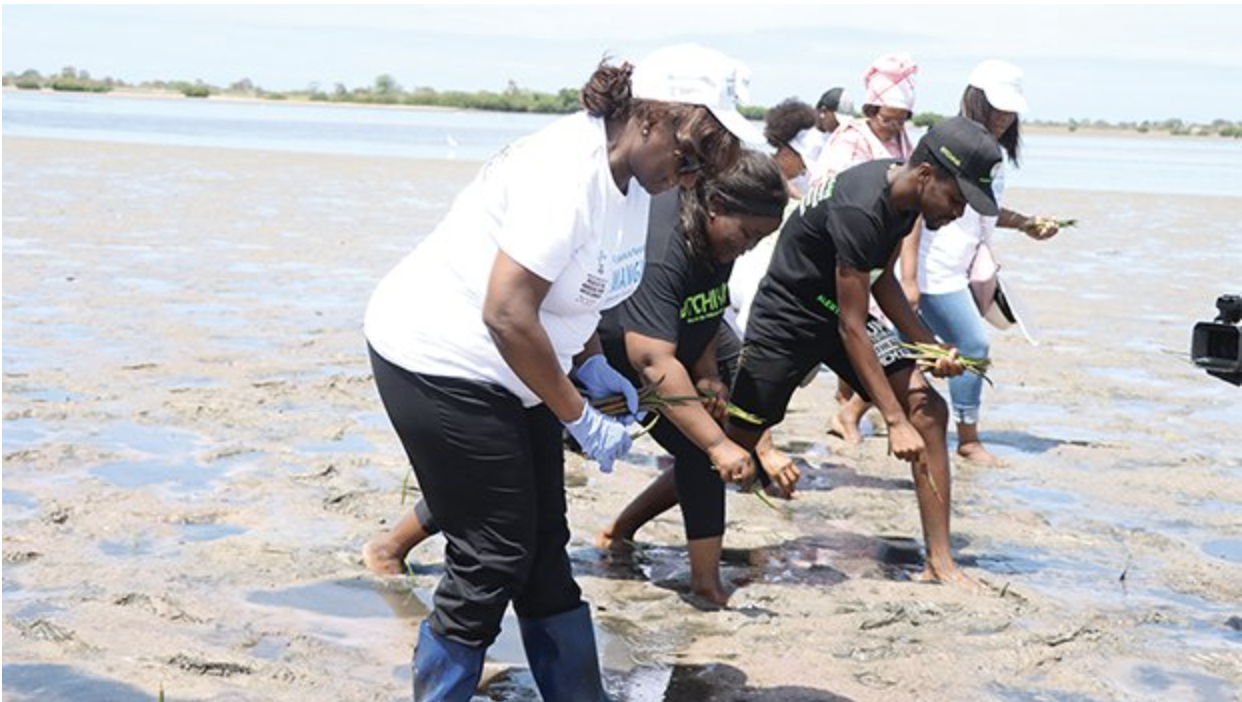
Carmem Sacramento Neto said that the act served to guarantee the protection of the national ecosystem
The project, an initiative of the Otchiva Association, aims to protect and conserve natural and tropical plant species located in coastal areas.
"With this action, we want to convey that we are concerned about the ecosystems and their maintenance so that they are healthy. Today we planted four boxes of mangroves, about one hectare, which is the target set for this area of Ramiros," said Carmem Neto.
The Minister added that the Executive is supporting the project by the NGO Otchiva, with support from ADPP Angola, which is responsible for the plant nurseries, from the Ministry of the Environment and from the Provincial Government of Luanda. According to the Minister, the Executive also intends to carry out reforestation in the provinces of Soyo, Nzeto and Cabinda, as these are areas with a higher incidence of mangroves.
She added that planting more mangroves helps preserve the coastline, as well as communities that rely on the coastline as a source of livelihood, such as fishermen.
The Minister of Fisheries took the opportunity to invite society to join the project.
Fernanda Renée, head of the Otchiva Association that aims to protect, conserve and restore mangrove ecosystems, said that the biggest concern has been coastal constructions. "The mangroves are under pressure from pollution, and the construction of houses, hotels and resorts on the coastline," adding that the Otchiva group is appealing to the Government not to give away land in these ecosystems.
The founding member of Otchiva said that Angola already has approximately two million mangroves planted along the coastline.
"We have mangroves all along the coastline, from Cabinda, Zaire, Bengo, Luanda and Benguela. The mangroves are being destroyed and Otchiva has been working to raise everyone's awareness for the benefit of this common good".
The mangroves are nurseries of marine life, where many species such as fish, crustaceans and molluscs live. It is the habitat of several migratory birds such as flamingos and pelicans, and are subsistence resource area for communities. Fishermen exploit marine resources in these areas.
Fernanda Renée advised that the mangroves are important for protecting the coastline, preventing flooding and erosion, and their forests absorb large amounts of carbon dioxide.
The Deputy Governor of Luanda Province, Gilson Carmelino, said that the Provincial Government (PGL) supports all activity related to the protection of mangroves and the ecosystem. "We will continue to work to prevent all activity and actions that are linked to the degradation of the mangroves."
"There is work to be done by PGL to regulate construction in coastal areas where there are mangroves. Through the administrations and districts, the Provincial Government has been working on supervision to ensure that licenses are issued the construction of buildings or dwellings in mangrove protection zones.”
Two million already planted
The coordinator of the mangrove reforestation project, Fernanda Renée revealed yesterday that since 2016 Angola has reached a total of 2 million mangroves already planted, throughout the coastal zone of the national territory.
The Mussulo Peninsula in Luanda, she said, uses the mangroves for various purposes, from the use of this ecosystem for fishing and for collecting crustaceans and molluscs. "The construction of salt flats and the exploitation of salt is carried out in a disorderly manner and its extension has put pressure on the mangrove ecosystems," she explained, “which harbour numerous species, form a subsistence zone for communities living here, and perform an important function along the coastline, whose forests sequester and store more carbon dioxide than any other forest.”
The destruction of this ecosystem, she revealed, results in the disappearance and extinction of many species, as well as the appearance of ocean swells that provoke flooding and environmental catastrophes. "The community must be educated and made aware about the importance of mangroves and the sustainable use of these marine ecosystems," she advised.
Article on Jornal de Angola, 01.11.2022
by Manuela Mateus
A project aimed at increasing environmental awareness and organizing society to promote the urban environment, through the policy of reducing, reusing and recycling materials and energy, was presented yesterday in the Urban District of Zango, province of Luanda, by Non-Governmental Organization Development Aid from People to People (ADPP), in partnership with the Provincial Government of Luanda.
The project, called "Viana Verde," (Green Viana) aims to improve the management of natural resources, as well as to mobilize women and young people in the urban districts of Zango and Estalagem to participate in environmental actions, urban embellishment, planting trees and stimulating environmental education and entrepreneurship, through the recycling of paper, plastic, glass and metal.
The chairperson of the Board of Directors of ADPP Angola, Rikke Viholm, said that the project will be implemented over three years with funding from the European Union, which provided 375,000 euros, and from ADPP and partners, who contributed 103,000 euros.
Rikke Viholm said that the project aims to contribute to a better management of natural resources, through the reduction, reuse and recycling of materials and energy, as well as to improve the socioeconomic conditions of women and young people in the Urban District of Zango. The project also aims to increase the involvement of young people in voluntary work, as well as the creation of environmental brigades in communities and leisure spaces for children and adolescents.
The representative of the European Union (AU) in Angola, Áurea Teixeira, said that the aid was granted in relation to strengthening the intervention of civil society organizations and local authorities, to contribute to good governance and management of natural resources.
According to the Provincial Director of the Environment, Vânia Vaz, the municipality of Viana has a rich biological diversity. She added that preserving the ecosystem is essential for the sustainable development of the municipality, and everyone should participate.
"We need to talk about reforms, so that we can reduce the felling of trees and destruction of flora, promoting the creation of school gardens, with feasible plans, which allow, in a short period of time, to restore green spaces in the municipality of Viana," she said.
Read the article in Portuguese here:
https://www.jornaldeangola.ao/ao/noticias/municipio-de-viana-aposta-em-reciclagem-de-material/
Article on Angop, Huambo, 25 November 2022
350 trees of different species were planted this Friday in the municipality of Caála as part of ADPP’s tree planting campaign.
Red acacia, eucalyptus, cedar and pine tree were planted in the city of Caála and in the surroundings of the communal villages of Calenga, Catata and Cuima, in a contribution to the protection of the environment and to urban beautification.
ADPP regularly supplies trees for reforestation, ornament, and fruit production. Head of Basic Sanitation at the municipal administration of Caála, Matias Camuculo, said that ADPP volunteers planted ornamental trees (red acacias) in the main streets and avenues of the city of Huambo, while cedar, eucalyptus and pine, were made available to the municipalities of Calenga, Catata and Cuima, as part of reforestation.
He added that the local administration intends to involve the population in ecological programs, with a focus on preserving the environment, in order to avoid imbalances and, at the same time, prevent the city and the population from natural disasters affecting the communities. In 2021, 600 trees were planted in the municipality of Caála, located 23 kilometers west of the city of Huambo.
ADPP has been operating in Angola for over 20 years, working in the areas of education, health, agriculture, environment, community and integrated development of rural communities, by empowering individuals, families and communities to make positive changes in their lives. In Huambo province, the organization has two teacher training schools in the municipalities of Huambo and Londuimbali, in addition to developing various community projects in other municipalities.
Read the article in Portuguese here:
https://www.angop.ao/noticias/ambiente/adpp-promove-campanha-de-arborizacao-na-caala/
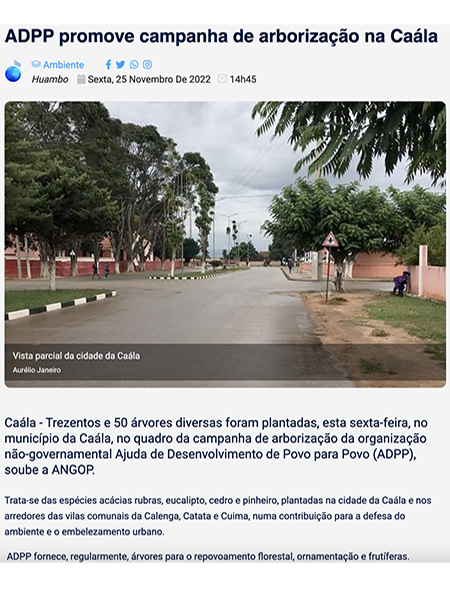
ADPP, OSS and the Ministry of Culture, Tourism and Environment of Angola hosted a virtual session as part of the COP27 Africa Regional Resilience Hub series of engagements and programmes during August and September 2022. The session was based on the ADSWAC project in Angola and Namibia, and focused on climate funding challenges and opportunities for African CSOs.
The COP27 Africa Regional Resilience Hub ensures African priorities, actions, solutions and challenges are heard and communicated, by listening to what is happening on the ground, how CSOs are working, what people are thinking, and what they need. Information and messages drawn from communities and individuals most impacted by climate change will be passed on and amplified at the forthcoming COP27 in Sharm El Sheikh, Egypt, at the beginning of November.
The COP27 Africa Regional Resilience Hub is led by the Climate Development Knowledge Network (CDKN), hosted by SouthSouthNorth. It is one of four regional hubs of the COP27 Resilience Hub, which intends to provide a dynamic and diverse space both at and between UNFCCC COPs to advance inclusive and ambitious action on adaptation and resilience. It serves as the home to the Race to Resilience campaign at COP, representing over 1,500 non-state actors taking action on resilience around the world.
The virtual programme from 19-22 September included 16 sessions on the priority themes of finance and investment, food and agriculture, resilient infrastructure, water and natural ecosystems, and cities and urbanisation. Cross-cutting themes included gender and social inclusion, and engaging and amplifying local voices.
Bottom-up approaches towards climate funding: challenges and opportunities of African CSOs was led by David Kerkhofs, Climate Change Adaptation Coordinator at Humana People to People. The speakers were Steve Muhanji, Senior Project Manager – East, Central and Southern Africa – Climate Finance & M&E Specialist, Sahara and Sahel Observatory (OSS); Khaoula Jaoui, Climate Department Coordinator, Sahara and Sahel Observatory; Evaristo Waya, Regional Project Director ADSWAC, ADPP Angola; Chris Dickinson, Ecosystems Management Senior Specialist, Division of Mitigation and Adaptation, Green Climate Fund; Farayi Madziwa, Readiness Program Officer, Adaptation Fund; and Giza Gaspar Martins, President of the Regional Steering Committee for ADSWAC and the National Director for Environment and Climate Action in Angola.
Steve Muhanji from OSS gave a brief introduction to the ADSWAC Project, after which the various speakers addressed the theme of the session. Farayi Madzawi spoke of the importance of local organisations and locally led climate actions, with strong stakeholder engagement and increased country ownership. A focus on local involvement in decision-making was required, and making the most of local knowledge contributed to stimulating innovation. Chris Dickinson went even further by saying that a project could fail without community involvement in decision-making and implementation. As a specialist in ecosystem management, he said he could get data on Angola from a book to prepare a project proposal, but that kind of approach was unacceptable. Information had to be gained in the field. He also commented on the need to improve communication, and not rely on filling reports with numbers and figures, but provide on the ground information, with examples of how individuals have been affected by a project. Moreover, there were lessons to be learned both from successes as well as from failures. Evaristo Waya spoke from his extensive experience during the preparative phases and now implementation of the ADSWAC Project. He said the involvement of the community was basic, with respect to priorities, needs, participation and ownership, as was that of all stakeholders, including the government, regarding sustainability. He made special mention of indigenous populations and, during the question-and-answer session, of the removal of barriers to the full participation of women. 50% of beneficiaries of the ADSWAC Project are women, who are beginning to play on a level field thanks to literacy lessons and changes to land ownership laws and attitudes. Faraya Madziwa confirmed the importance of the inclusion of women, by saying that a funding proposal would not even be considered without this. Paying lip-service to gender equity was not enough.
Watch the full session here: https://www.youtube.com/watch?v=MKutXBw8K6c
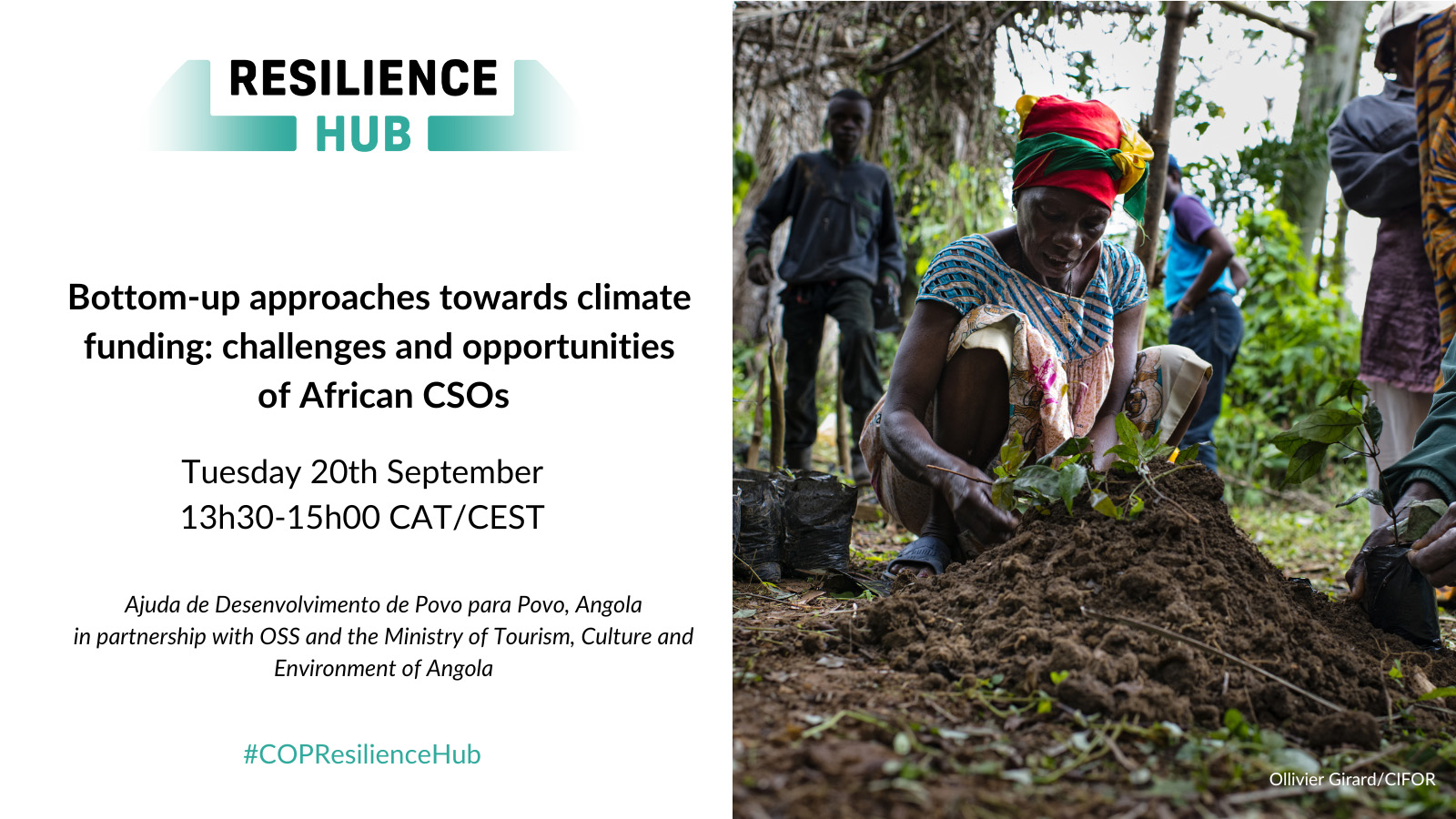
Em comemoração ao dia da terra, mostramos como fazer hortas com materiais reciclados
O projecto STEM financiado pela Associação do Bloco 15, ExxonMobil em Angola apresenta a criação de hortas, em áreas sem espaço de terra não arável, com recipientes plásticos de água recolhidos no lixo doméstico, areia e compostos orgânicos resultantes da mistura de restos de alimentos e etc.
Método de preparo, ver na imagem.
With Global Fund financing, UNDP supports community-based health services in Angola to fight TB. Photo: UNDP Angola





